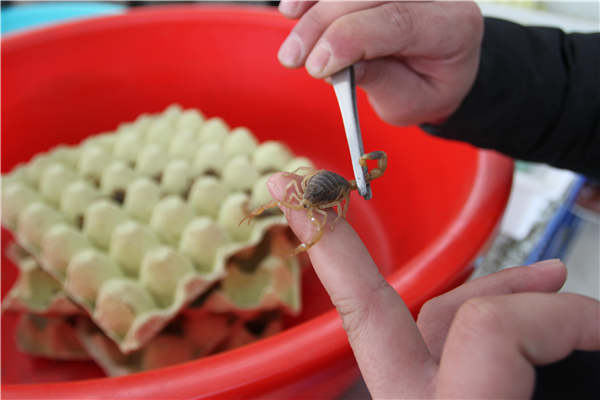 |
|
A Manchurian scorpion that is found in China and other parts of East Asia. |
Drilling wells
As it snakes around a peak, a path places the village in full view. Rainwater harvesting is an essential part of life in Nongjing that has struggled with groundwater sources for decades. The area is said to have water trapped in aquifers but extraction has proved difficult in the past. In addition, the mountain rocks often crumble like chalk.
After a failed attempt to drill a well, authorities have decided to dig deeper - at least 280 meters below - in pursuit of water this time. A team of four engineers from a Liuzhou-based company in Guangxi has pitched a tent on a desolate cliff since November, looking to accomplish the mission through rain and wind.
A road along 11 kilometers will be constructed to connect the area's villages, says Qiu, the official from the scorpion farm.
In Nongteng, a village of nearly 30 households situated downhill from Nongjing, the county government is encouraging tourism to boost incomes. A few cottages have been painted in blue and red to draw city dwellers keen on experiencing the quiet countryside. Lan Fanglin, 33, says at her hotel, a room's rent is 80 yuan a night. She calls the business profitable.
But Wei Yuguan, a 48-year-old former plastic factory worker in Nanning, who has managed a neighboring hotel since 2015, says her property sees very few customers.
An orchard in the county's Duyang town offers an example of private-public partnership in poverty reduction in this part of Guangxi. In the past three years, oranges from this joint venture have been sold to retailers in Beijing, the city of Shenzhen and the provinces of Qinghai and Shangdong.
"A casual worker can make 70 yuan or more a day," the town's mayor Luo Yuehua says, adding that dozens of families are involved in the orchard business.
Tang Xiumei, 50, finds watering orange trees easier than her previous wood-factory shifts for 80 yuan a day. And, Huang, a 60-year-old woman who gives a lone name, expects her annual income of 2,800 in 2016, to increase with her new job this year. Her daughter's death has left her to fend for two grandchildren. Her work profile is similar to Tang's at the orchard.
Guangxi spent 18.7 billion yuan on poverty reduction projects last year, with emphasis on activities ranging from industrial programs to trade enhancement with neighboring country Vietnam, which lies to its west. Some patches of rural Guangxi have remained underdeveloped for long, in part due to regional disparities in growth.
"But the aim is to get there by 2020," Zhu Youkui, the chief economist for the local government's poverty alleviation unit, says in Nanning.
|
|
|
|
|
|
|
|
